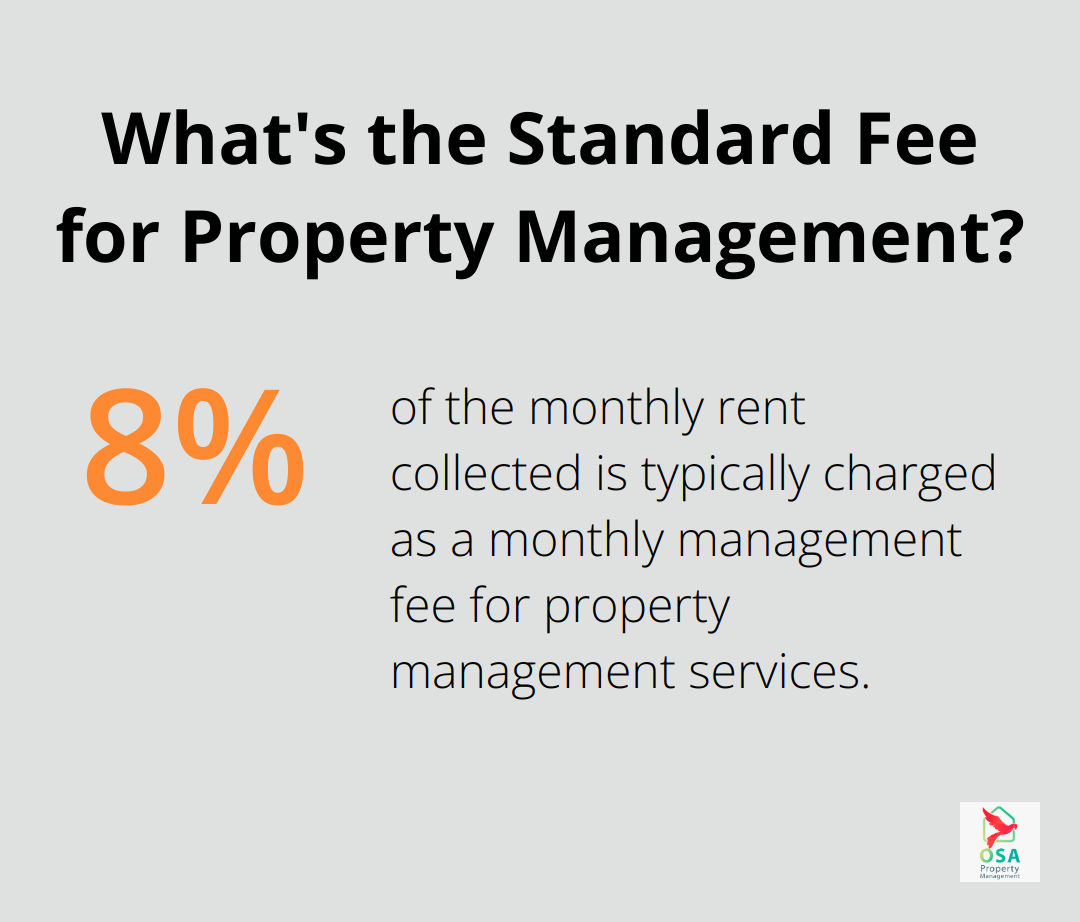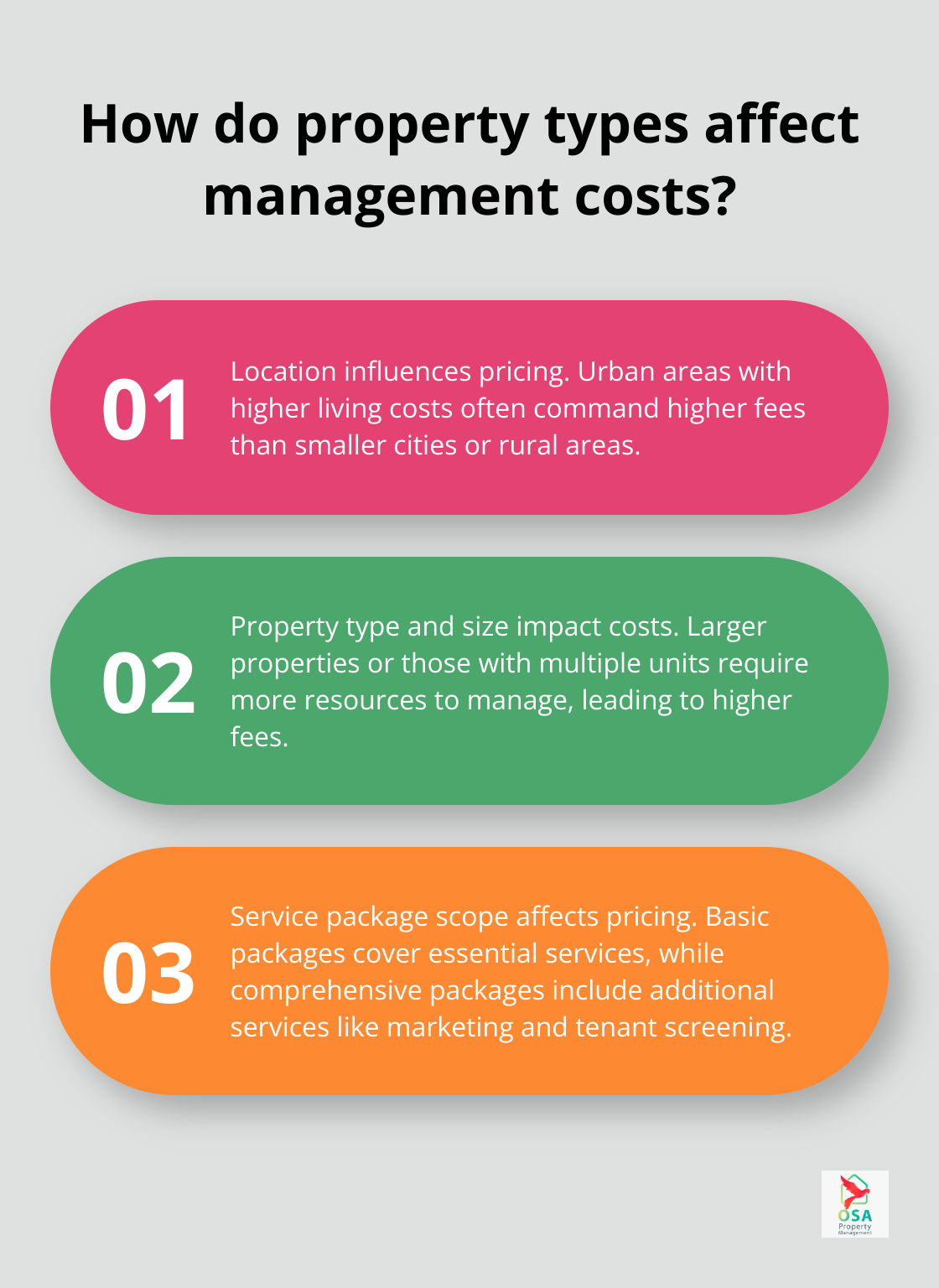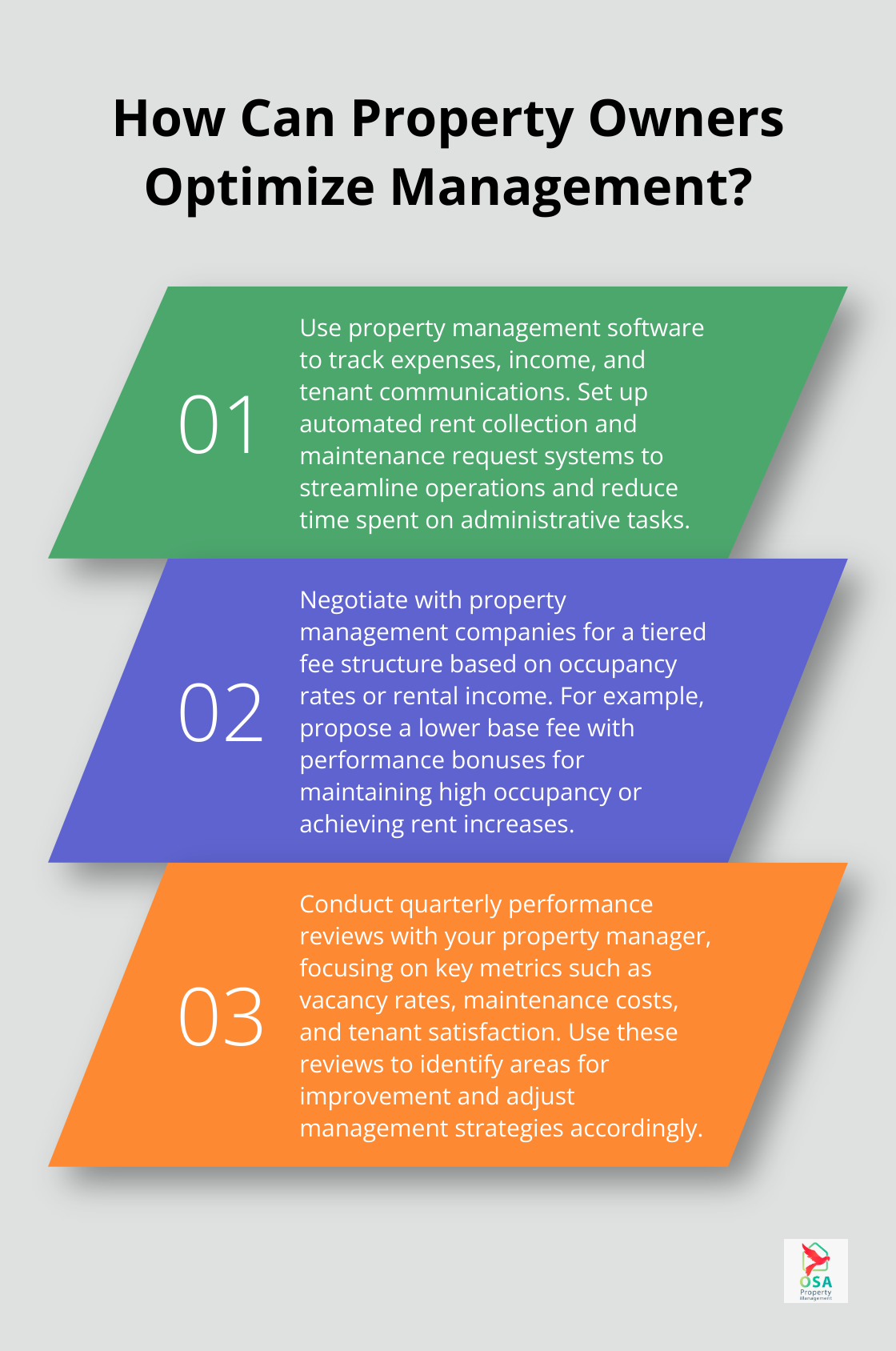Property management fees can be a complex topic for landlords and real estate investors. At Osa Property Management, we often hear questions about the true cost of property management services.
This blog post will break down the various types of fees, factors that influence pricing, and average ranges you can expect. We’ll also provide insights on how to evaluate the value of property management services beyond just the cost.
What Are Common Property Management Fees?
Property management fees can vary widely, but understanding the most common types will help you budget effectively for your investment property. Let’s break down the typical fees you might encounter in the property management industry.
Monthly Management Fee
The monthly management fee forms the foundation of property management services. This fee typically ranges from 8% of the monthly rent collected. For a property renting at $1,200 per month, you could expect to pay around $96 in management fees. This covers day-to-day operations, rent collection, and tenant communications.
Leasing and Tenant Placement Fee
When your property needs a new tenant, most management companies charge a leasing fee. This one-time fee often equals 50% to 100% of one month’s rent. It compensates for marketing the property, screening tenants, and handling the lease signing process. Some companies may offer more competitive rates, so it’s worth asking about their specific fee structure.
Maintenance and Repair Costs
Maintenance fees keep your property in top condition. Many companies charge a percentage markup on maintenance costs (usually around 10%). This covers their time coordinating repairs and overseeing contractors. Some firms have in-house maintenance teams, which can sometimes lead to cost savings for property owners.
Eviction Handling Fees
While we hope you never need it, eviction services are sometimes necessary. Eviction fees can range from $250 to $500 (not including legal costs). Some management companies offer eviction protection plans for a monthly fee of $50 to $100, which can provide peace of mind and financial protection against unexpected eviction expenses.
Vacancy and Inspection Fees
During vacant periods, some companies charge a vacancy fee to cover ongoing management and marketing efforts. This can range from $50 to $200 per month. Regular property inspections are important for maintaining your investment.

It’s important to note that not all management companies structure their fees the same way. We recommend discussing fee structures in detail with potential management companies to ensure you’re getting the best value for your investment. Now, let’s explore the factors that influence these property management costs.
What Impacts Property Management Costs?
Location Influences Pricing
The location of your property significantly affects management costs. Urban areas with higher living costs and more competitive markets often command higher fees. Property management in San Francisco or New York City typically costs more than in smaller cities or rural areas. This stems from higher operational costs and the increased complexity of managing properties in bustling urban environments.
Property Type and Size Matter
The type and size of your property play a crucial role in determining management fees. Larger properties or those with multiple units require more time and resources to manage, which often translates to higher fees. Luxury properties or those with special amenities may incur additional costs due to the extra attention and specialized services they require.
Service Package Scope Affects Pricing
The range of services included in your management package directly impacts the overall cost. Basic packages might cover only essential services (like rent collection and maintenance coordination), while comprehensive packages could include everything from marketing and tenant screening to financial reporting and legal compliance.
Management Company’s Experience Counts
The experience and reputation of the property management company also factor into their pricing. While it might be tempting to opt for the lowest-cost provider, experienced companies often bring valuable expertise and established processes that can save you money in the long run. They may have better relationships with vendors, more efficient systems, and a track record of maximizing rental income.
Market Conditions Shape Fees
Local market conditions can influence property management fees. In highly competitive markets, management companies might adjust their pricing to stay competitive. Conversely, in markets with few management options, prices might be higher due to limited competition.
Technology and Reporting Impact Costs
The level of technology and reporting offered by a management company can affect costs. Companies that invest in advanced property management software and provide detailed, real-time reporting may charge higher fees, but these tools can often lead to better property performance and more transparent operations.

These factors play a significant role in shaping property management costs. As we move forward, let’s explore the average fee ranges you can expect for different types of properties.
What Are Typical Property Management Fee Ranges?
Residential Property Management Fees
Property managers usually charge between 8% and 12% of rent collected for their services, which include tenant communications, property inspections, and other management tasks. However, local market conditions and specific services can cause this percentage to fluctuate.

High-cost urban areas (such as San Francisco or New York City) often see fees at the upper end of this range or even higher. Smaller cities or rural areas tend to have fees closer to the lower end. For a property renting at $1,500 per month, management fees might fall between $120 and $180.
Commercial Property Management Fees
Commercial property management fees differ from residential fees due to increased complexity and specialized knowledge requirements. These fees typically range from 4% to 12% of the gross rent collected. Larger properties or those with long-term, stable tenants often qualify for lower percentage fees.
A small retail space might incur a management fee of 8-10%, while a large office building with multiple tenants could see fees in the 4-6% range. Commercial property management often includes additional fees for services like lease negotiations or project management for tenant improvements.
Vacation Rental Management Fees
Vacation rental management fees tend to be higher than traditional residential fees. Full-service management typically costs between 20% and 35% of the monthly revenue for most of the US. The increased turnover and marketing requirements result in these higher fees.
Popular tourist destinations might see management companies charge lower percentages but make up for it with higher booking volumes. A vacation rental in Hawaii might incur management fees around 25-30%, while a less frequented destination might charge 30-35% but with fewer bookings.
Factors Influencing Fee Structures
Several factors influence property management fee structures:
- Location: Urban areas with higher living costs often command higher fees.
- Property type and size: Larger or more complex properties require more resources to manage.
- Service package scope: Basic packages cost less than comprehensive ones.
- Management company’s experience: Established companies might charge more but offer valuable expertise.
- Market conditions: Competitive markets can influence pricing strategies.
Evaluating Value Beyond Percentages
When considering property management services, look beyond just the percentage fee. Factors such as local market knowledge, service quality, and the range of offerings should all play a role in your decision-making process. A slightly higher fee from a company with a proven track record and comprehensive services can often lead to better returns and fewer complications in the long run.
Final Thoughts
The cost of property management fees varies based on factors like location, property type, and service scope. A skilled property manager brings expertise, efficiency, and peace of mind to your investment. They handle operations, navigate regulations, and work to maximize your property’s potential.

At Osa Property Management, we offer customized service packages tailored to your specific needs. Our team manages everything from marketing and renter relationships to bill payments and tax compliance. We ensure your property remains well-maintained and profitable.
We encourage you to consider more than just the cost when evaluating property management services. Think about the time saved, stress avoided, and potential increase in your property’s value and income. Contact Osa Property Management for a personalized quote and learn how we can add value to your Costa Rica investment.

